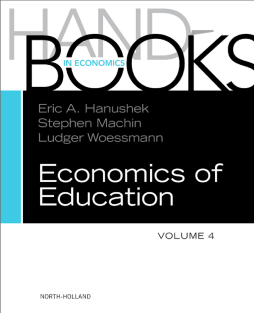
BOOK
Handbook of the Economics of Education
Eric A Hanushek | Stephen J. Machin | Ludger Woessmann
(2011)
Additional Information
Book Details
Abstract
What is the value of an education? Volume 4 of the Handbooks in the Economics of Education combines recent data with new methodologies to examine this and related questions from diverse perspectives. School choice and school competition, educator incentives, the college premium, and other considerations help make sense of the investments and returns associated with education. Volume editors Eric A. Hanushek (Stanford), Stephen Machin (University College London) and Ludger Woessmann (Ifo Institute for Economic Research, Munich) draw clear lines between newly emerging research on the economics of education and prior work. In conjunction with Volume 3, they measure our current understanding of educational acquisition and its economic and social effects.
- Winner of a 2011 PROSE Award Honorable Mention in Economics from the Association of American Publishers
- Demonstrates how new methodologies are yielding fresh perspectives in education economics
- Presents topics and authors whose data and conclusions attest to the globalization of research
- Complements the policy and social outcomes themes of volume 3
"2011 PROSE Award Honorable Mention for Economics"
"The increased importance of knowledge, skills, and information in the modern economy means that human capital and education will be even more important in the future than it has been during the past 50 years. ... The articles in these handbook volumes convey some of the excitement that continues in research on the economics of education."--Gary S. Becker, University of Chicago
"This important volume follows soon after volume 3, so together they provide up-to-date expert evaluations of the latest research findings on the economics of education, including some significant topics that are little discussed by economists. There are chapters on how psychological behavior affects economic decisions; the relation between educational achievement on one hand and criminal activity, good health, and political participation on the other; and the relation between education and the process of economic development. Other chapters address more familiar issues, such as education and migration, the use of school vouchers, overall school financing, and performance pay for teachers. One chapter considers an intriguing issue--whether there has been, or can be, over education. Most readers will appreciate the chapter on the determinants of college achievement. Each of the nine long essays comes with an unusually extensive bibliography. Of strong value for researchers and professional educators. Summing Up: Highly recommended. Upper-division undergraduate through professional collections." - CHOICE, August 2012, Vol. 49, No. 11, page 153
